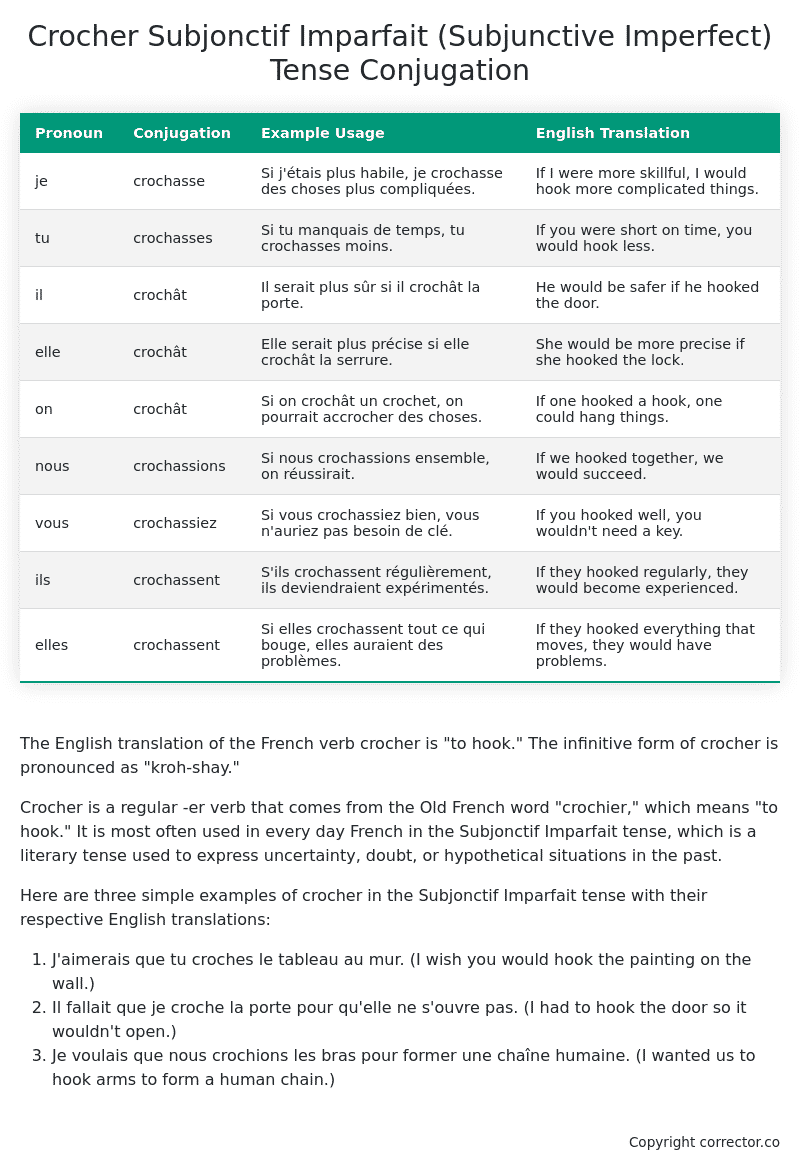Subjonctif Imparfait (Subjunctive Imperfect) Tense Conjugation of the French Verb crocher
Introduction to the verb crocher
The English translation of the French verb crocher is “to hook.” The infinitive form of crocher is pronounced as “kroh-shay.”
Crocher is a regular -er verb that comes from the Old French word “crochier,” which means “to hook.” It is most often used in every day French in the Subjonctif Imparfait tense, which is a literary tense used to express uncertainty, doubt, or hypothetical situations in the past.
Here are three simple examples of crocher in the Subjonctif Imparfait tense with their respective English translations:
- J’aimerais que tu croches le tableau au mur. (I wish you would hook the painting on the wall.)
- Il fallait que je croche la porte pour qu’elle ne s’ouvre pas. (I had to hook the door so it wouldn’t open.)
- Je voulais que nous crochions les bras pour former une chaîne humaine. (I wanted us to hook arms to form a human chain.)
Table of the Subjonctif Imparfait (Subjunctive Imperfect) Tense Conjugation of crocher
| Pronoun | Conjugation | Example Usage | English Translation |
|---|---|---|---|
| je | crochasse | Si j’étais plus habile, je crochasse des choses plus compliquées. | If I were more skillful, I would hook more complicated things. |
| tu | crochasses | Si tu manquais de temps, tu crochasses moins. | If you were short on time, you would hook less. |
| il | crochât | Il serait plus sûr si il crochât la porte. | He would be safer if he hooked the door. |
| elle | crochât | Elle serait plus précise si elle crochât la serrure. | She would be more precise if she hooked the lock. |
| on | crochât | Si on crochât un crochet, on pourrait accrocher des choses. | If one hooked a hook, one could hang things. |
| nous | crochassions | Si nous crochassions ensemble, on réussirait. | If we hooked together, we would succeed. |
| vous | crochassiez | Si vous crochassiez bien, vous n’auriez pas besoin de clé. | If you hooked well, you wouldn’t need a key. |
| ils | crochassent | S’ils crochassent régulièrement, ils deviendraient expérimentés. | If they hooked regularly, they would become experienced. |
| elles | crochassent | Si elles crochassent tout ce qui bouge, elles auraient des problèmes. | If they hooked everything that moves, they would have problems. |
Other Conjugations for Crocher.
Le Present (Present Tense) Conjugation of the French Verb crocher
Imparfait (Imperfect) Tense Conjugation of the French Verb crocher
Passé Simple (Simple Past) Tense Conjugation of the French Verb crocher
Passé Composé (Present Perfect) Tense Conjugation of the French Verb crocher
Futur Simple (Simple Future) Tense Conjugation of the French Verb crocher
Futur Proche (Near Future) Tense Conjugation of the French Verb crocher
Plus-que-parfait (Pluperfect) Tense Conjugation of the French Verb crocher
Passé Antérieur (Past Anterior) Tense Conjugation of the French Verb crocher
Futur Antérieur (Future Anterior) Tense Conjugation of the French Verb crocher
Subjonctif Présent (Subjunctive Present) Tense Conjugation of the French Verb crocher
Subjonctif Passé (Subjunctive Past) Tense Conjugation of the French Verb crocher
Subjonctif Imparfait (Subjunctive Imperfect) Tense Conjugation of the French Verb crocher (this article)
Subjonctif Plus-que-parfait (Subjunctive Pluperfect) Tense Conjugation of the French Verb crocher
Conditionnel Présent (Conditional Present) Tense Conjugation of the French Verb crocher
Conditionnel Passé (Conditional Past) Tense Conjugation of the French Verb crocher
L’impératif Présent (Imperative Present) Tense Conjugation of the French Verb crocher
L’infinitif Présent (Infinitive Present) Tense Conjugation of the French Verb crocher
Struggling with French verbs or the language in general? Why not use our free French Grammar Checker – no registration required!
Get a FREE Download Study Sheet of this Conjugation 🔥
Simply right click the image below, click “save image” and get your free reference for the crocher Subjonctif Imparfait tense conjugation!

Crocher – About the French Subjonctif Imparfait (Subjunctive Imperfect) Tense
Formation
Common Everyday Usage Patterns
Interactions with Other Tenses
Subjonctif Présent
Indicatif Passé Composé
Conditional
Conditional Perfect
Summary
I hope you enjoyed this article on the verb crocher. Still in a learning mood? Check out another TOTALLY random French verb conjugation!


